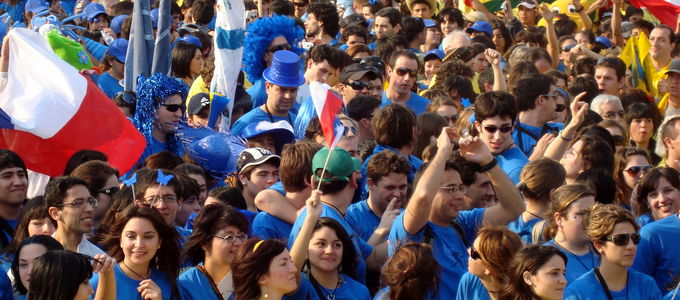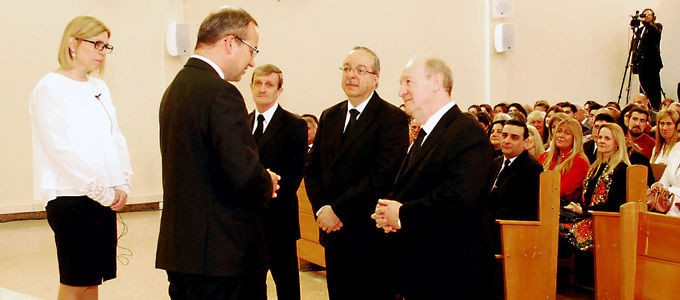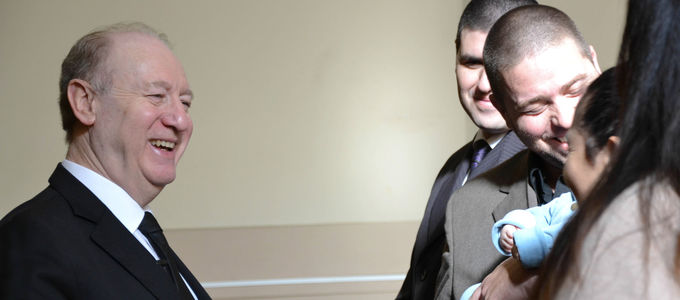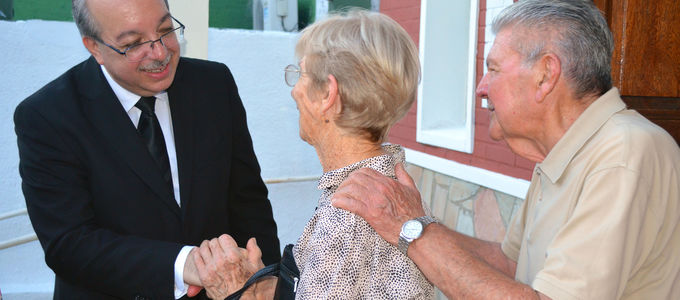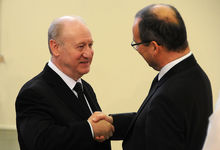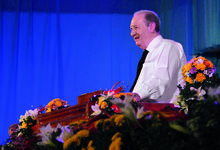“Always speak the language of love”
Enrique Eduardo Minio is at work as the “architect of the future” in the southern regions of South America. That is how the Chief Apostle referred to him at his ordination. What does this mean in practice? Following is an interview with both the former District Apostle and the new District Apostle.
“The future”—this is often also a question of demographic development. How does this look in the countries entrusted to your care?
District Apostle Enrique Eduardo Minio: The demographic development in my working area is more favourable than elsewhere in general, but in the long term, the tendency will be similar to that of European society.
Retired District Apostle Norberto Passuni: In total, children and youth account for 25 per cent of all those who attend divine services. This means that the age pyramid has shrunk a little bit at the base and widened at the top over the last few years.
What do children and youth need in order to be happy children of God in the future?
Minio: Children and youth are a great challenge for our Church. They need help and education on the basis of the gospel of Christ so that the Church becomes a key component of their lives. We are constantly working on finding new ways forward in the areas of education and music, but we know that this is not enough. This topic is a high priority in our plans for the future.
Argentina is currently in a serious economic crisis. What effect does this have upon church life?
Minio: In many families the crisis has led to a decrease in buying power, while others suffer from unemployment. Those who are employed must work more hours, which means that members have less time for their faith life and that the ministers have less time for their work in the Church. Even our offerings have declined. Despite the difficult circumstances of the time, however, we can be thankful to our heavenly Father that the people of God here in our working area continue to battle onward tirelessly.
What are the special challenges and what are the special opportunities in your District Church?
Minio: Both the challenge and the opportunity for the Church in its outward activity consists of preaching the gospel in a time when the needs of the soul appear secondary and the message of God’s love and redemption is not a priority.
As I see it, the challenge to the Church from within is to ensure that each congregation and each region has enough local ministers available. This makes it possible for the congregations and districts to grow and develop enduringly without support from outside.
A further challenge is to see to it that the cultural differences in the four countries of our working area do not constitute an obstacle for fellowship. The tireless efforts of our brothers and sisters, along with the desire to be one in Christ, are a good foundation for this.
How have you managed to approach the differing cultural needs of the members in the various countries?
Passuni: My understanding has always been that our mission consists of bringing the gospel to the people, not changing their cultural norms—as long as these do not contradict the gospel. One must take into consideration that, before they became independent, the countries belonging to our district once comprised a single political unit which was ultimately dependent on the Spanish crown. This common background, especially in terms of language and religion, has remained largely intact.
There is a common framework for the whole region within which each individual country, and even each area, has its special character. But above all, I have experienced that our members’ awareness of their childhood in God has priority over all cultural nuances, and even causes the latter to appear secondary. Such experiences are really quite touching.
When you look back over your time of office as District Apostle, which developments would you regard as milestones of the Church?
Passuni: The development toward unity. When Chief Apostle Leber assigned me the responsibility of District Apostle, he told me to make oneness a priority. The Lord Jesus also prayed for this in the intercessory prayer, when he began to talk about “those who will believe in Me through their word” in the third part of the prayer. This oneness is a true sign “that the world may believe that You sent Me”.
What is your special concern for the future? What goals have you set for yourself?
Minio: I am especially mindful of the “Vision” of our Church, as it is described in the Catechism. I would like to work on implementing this vision every day, together with our brothers and sisters.
For the first year in my new ministry I have set myself the goal of getting to know and understand each area that belongs to my assignment as District Apostle, as well as to preserve that which has been built up by my predecessors, to measure every decision by the doctrine of Jesus Christ and the promise of His return, to protect the unity of the ministers and souls in my care, and in the process, always speak the language of love.
How do you see the future of the Church?
Passuni: With absolute trust. The lively hope in the return of the Lord under today’s conditions is a clear sign of the presence of God in our midst.
Article info
Author:
Date:
Keywords:
Andreas Rother
27.07.2016
Argentina,
Chile,
Paraguay,
Uruguay,
International,
People/Personalities


